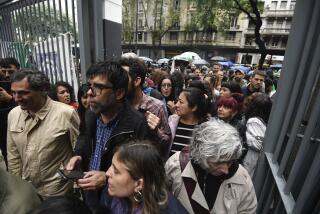Sarney Lays Off 60,000 in Bid to ‘Save’ Brazil
- Share via
RIO DE JANEIRO — President Jose Sarney has laid off 60,000 government employees, frozen wages and prices and revamped the currency in a program of “national salvation” designed to combat 933% inflation.
“No democracy can be preserved in a situation of hyperinflation,” he said in announcing the austerity program to the nation late Sunday. “We need to summon our courage to make sure that we don’t see blood and tears. To avoid that, we must rely on our sweat and sacrifice.”
Union leaders immediately threatened to call for a nationwide general strike to protest the measures, which eliminate a system that ties wage increases to inflation.
The new program is the fourth major package of economic measures imposed by Sarney, who took office in March of 1985, ending 21 years of repressive, right-wing military rule.
Sarney, in his nationwide radio and television address, referred to it as “a program of national salvation” and called on Brazil’s 154 million people to fight a “total war against inflation using the toughest weapons and most profound measures Brazil has ever taken.”
He said banks would be closed today and Tuesday to give them time to adapt to the new measures, which include a 17% devaluation of the cruzado and creation of the so-called “new cruzado” worth 1,000 old ones.
Among the measures designed to slash the massive public spending deficit were firing about 60,000 civil servants, the elimination of five Cabinet ministries and the closing of 42 state companies and agencies.
The package also includes a 45-day price freeze on about 200 basic commodities.
Sarney said it also aims to spur the economy and reduce a budget deficit that now runs at 6% of the gross national product. Last year, the GNP grew just 0.04%, while industrial growth fell 2.23% from 1987, government figures show.
Union leaders immediately criticized the plan.
“We weren’t consulted about the measures, which will once more cut into workers’ salaries,” said Luiz Mederos, leader of the Sao Paulo metalworkers’ union. “I have no doubts angry workers will react negatively and they will have our support in organizing a nationwide strike.”
Union figures show that in the past two years, workers’ purchasing power has dipped by about 40% due to inflation.
Brazil’s past measures, though initially successful, have been unable to contain inflation.
Brazil’s inflation rate hit an all-time-high annual rate of 933% in 1988, substantially higher than 366% during the previous year.
Inflation in December rose to 28.8%, well above the 25% limit set by business, social and government leaders in a “social pact” announced in November.
Brazil is the Third World’s leading debtor nation, owing $115 billion.
More to Read
Sign up for Essential California
The most important California stories and recommendations in your inbox every morning.
You may occasionally receive promotional content from the Los Angeles Times.












